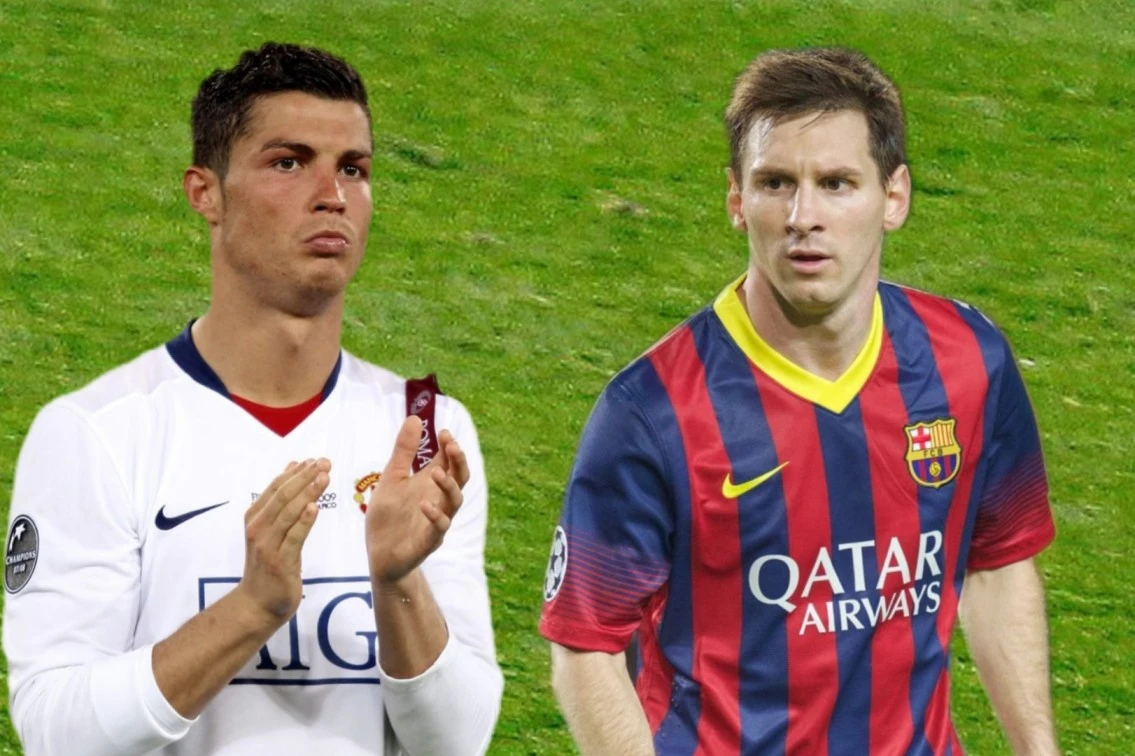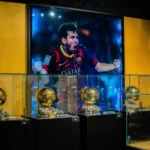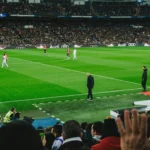Imagine a world without that Ronaldo bicycle kick against Juventus or Messi’s mazy dribble past five players to score. For nearly two decades, Cristiano Ronaldo and Lionel Messi revolutionized football, redefining excellence and turning the sport into a theater of endless possibility. Their rivalry didn’t just dominate headlines—it reshaped tactics, economics, and the very soul of the game. Let’s unpack how these two icons altered football’s DNA.
The Origins: How Messi and Ronaldo Revolutionized Football Through Opposing Paths
Lionel Messi: The Kid Who Overcame Limits
At 13, Messi moved to Barcelona’s La Masia academy from Argentina, his growth hormone deficiency necessitating nightly injections at Barça expense. Carles Rexach, the scout who signed him, famously wrote the contract on a napkin, stating, “We cannot miss this genius.” Under Barça’s tiki-taka regime, Messi developed into a false nine—a hybrid playmaker and goal-scorer. His 91 goals in a single calendar year (2012) and eight Ballon d’Or wins (as of 2023) demonstrate a career founded on technical wizardry and spatial intelligence. Pep Guardiola once said, “Messi is the only player who runs faster with the ball than without it.”
Cristiano Ronaldo: The Willpower Machine
Ronaldo’s path from Madeira’s streets to Manchester United’s Theatre of Dreams was driven by unyielding self-improvement. As a teenager, he’d remain after practice to work on free kicks, nicknamed “The Robot” for his commitment. Under Sir Alex Ferguson, he was remoulded from a showy winger into a goal machine, blending aerial superiority (his vertical jump is on par with NBA players), explosive pace, and clinical finishing. His five Champions League titles and all-time top scorer status in UEFA competitions reflect a career marked by adjustment. “I’m not a perfectionist,” Ronaldo explained, “but I like to feel that things are done well.”
The Rivalry That Raised the Bar
Messi and Ronaldo revolutionized football for more than a decade, the “Ronaldo vs. Messi” debate split pubs, sitting rooms, and social media. Yet their rivalry was not just about personality—it created tactical revolutions:
- Tactical Flexibility: Coaches began prioritizing versatile attackers. Ronaldo’s evolution from winger to striker at Real Madrid popularized fluid front threes, while Messi’s role under Guardiola inspired false-nine systems. José Mourinho noted, “Ronaldo made coaches rethink how to use wide players as central scorers.”
- Data-Driven Training: Clubs adopted sports science to extend player longevity. Ronaldo’s €100,000 cryotherapy chamber and Messi’s tailored nutrition plans (including yerba mate rituals) became blueprints for modern athletes.
- Set-Piece Mastery: Ronaldo’s 60+ free-kick goals and Messi’s curved penalties pushed teams to hire dedicated set-piece coaches.
- Their head-to-head stats (via ESPN) reveal a near-even split: 37 goals for Messi in El Clásico vs. Ronaldo’s 18, but Ronaldo leads 5-4 in Champions League titles.
Tactical Impact: How Messi and Ronaldo Revolutionized Football’s Playbook
Messi’s Symphony of Space
Messi’s low center of gravity and vision enabled him to take advantage of invisible gaps. His collaboration with Xavi and Iniesta at Barcelona was the very essence of collective brilliance, but his subsequent years at PSG and Inter Miami showcased his capacity to control tempo as a deep-lying playmaker. Diego Maradona once quoted, “Messi is a PlayStation player. You can’t defend him.”
- False Nine Revolution: Messi’s role in Guardiola’s 2009 sextuple-winning team forced defenders into “no-man’s land,” unsure whether to mark him or cover space.
- The Messi Zone: Analysts coined the term for his preferred area—right of the penalty arc—where he’s scored 25% of his goals (OptaJean).
Ronaldo’s Aerial Revolution
Ronaldo’s vertical leap (recorded at 2.93 meters) made crosses count, so that defenders were left having to favor power and height. His contribution to Real Madrid’s La Décima Champions League triumph displayed the potential of a single player to reshape championship approaches based on his threat from the air.
- The CR7 Header: His signature strike over Sampdoria in 2019, achieving a 28-inch vertical, spurred research in plyometric training among football schools.
- Extending Peak Performance: Ronaldo’s transition from speed-dependent winger to penalty-box predator lengthened his prime years, a trend emulated by Robert Lewandowski and Karim Benzema.
Key Stats Comparison:
| Metric | Messi | Ronaldo |
|---|---|---|
| Career Goals | 821+ | 885+ |
| Assists | 357+ | 234+ |
| Top Speed (km/h) | 32.5 | 33.6 |
| Trophies | 44 | 35 |
| Instagram Followers | 500M | 632M |
Data from Transfermarkt and FIFA reports.
Beyond the Pitch: Commercial and Cultural Titans
Branding the Beautiful Game
Ronaldo’s CR7 empire (fragrances, gyms, hotels) and Messi’s lifetime deal with Adidas turned them into global CEOs. Their social media influence drives billions in revenue—Ronaldo’s $136M earnings in 2023 (Forbes) included 60% from endorsements.
- Ronaldo’s “Save the Game” Campaign: His 2023 partnership with Nike blended activism and sport, promoting access to football in underserved communities.
- Messi’s UNICEF Partnership: Donating $10M to children’s hospitals, Messi leveraged his fame for philanthropy, inspiring athletes like Marcus Rashford.
How Messi and Ronaldo revolutionized Football Inspiring Generations
Messi and Ronaldo revolutionized Football and influencing Young stars like Kylian Mbappé and Erling Haaland model their games after this duo. Mbappé’s childhood bedroom, plastered with Ronaldo posters, and Haaland’s Messi-esque close control, exemplify their mentorship-by-example.
- The “Messi Generation”: Teenagers in Argentina now value dribbling training exercises above athleticism, changing the national focus on youth development.
- Ronaldo’s Training Videos: His gym routine that went viral triggered an international fitness fad, with apps such as “CR7 Fitness” gaining 5M downloads.
Legacy of Greatness: How Messi and Ronaldo Revolutionized Football
Their moves to Saudi Arabia (Al Nassr) and MLS (Inter Miami) expanded football’s frontiers. Ronaldo’s arrival doubled Al Nassr’s Instagram followers overnight, while Messi’s MLS debut broke Apple TV’s streaming records, with 1.5M subscribers signing up for the MLS Season Pass.
The Future of Football
- Youth Development: Academies now prioritize versatility over specialization. La Masia’s curriculum includes “positional fluidity” workshops, inspired by Messi.
- Tactical Trends: Hybrid roles (e.g., Phil Foden’s “free eight” position at Manchester City) mirror Messi’s adaptability.
- Longevity Standards: Playing into their late 30s, they’ve erased retirement timelines. Luka Modrić credits Ronaldo for his own career extension: “If he can do it at 38, why not me?”
Economic Ripples
- Ronaldo’s Saudi Effect: His $200M/year Al Nassr deal triggered a $1B spending spree by Saudi clubs on stars like Neymar and Benzema.
- Messi’s MLS Boom: Inter Miami’s valuation skyrocketed from $585M to $1.5B post-Messi, per Sportico.
Final Whistle: How Messi and Ronaldo Revolutionized Football – Who Did It Best?
Messi’s creativity and Ronaldo’s athleticism are two aspects of football’s soul. One redefined creativity; the other, human potential. Zlatan Ibrahimović put it best: “Messi is natural. Ronaldo is a product of work. Which is harder? I don’t know. But together, they made us all dream bigger.”
Their legacy isn’t about trophies—it’s about proving that greatness has no ceiling. Whether through a no-look pass or a gravity-defying header, they taught us that football is limitless.
Call to Action
Who influenced your love of football more—Messi’s magic or Ronaldo’s relentlessness? Share your take below, and tune in for our deep dive on Next Gen Stars Inspired by the GOATs
Visual Credits: Getty Images, UEFA, FIFA.
A dedicated tactical analyst with over 10 years of experience studying European football’s elite leagues. Imran follows the Premier League, La Liga, Serie A, and Bundesliga with particular focus on managerial systems and tactical evolution. Watching 2-3 matches weekly across these competitions, he has developed deep insights into how different coaching philosophies translate across leagues and cultures. At Latest in Football, Imran specializes in breaking down complex tactical decisions and managerial appointments for everyday football fans.




